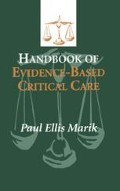Abstract
Acute renal failure (ARF) is a common and serious complication in seriously ill hospitalized patients. Indeed, the mortality of ARF in ICU patients has remained in excess of 50% despite improvements in renal-replacement therapy and aggressive supportive care. It is therefore essential that all efforts be made to avoid this complication; i. e., aggressive fluid resuscitation and avoidance of potentially nephrotoxic drugs (especially aminoglycosides and contrast media). The therapeutic intervention of choice in patients with oliguria is fluid resuscitation and not furosemide (see Chapter 17). Furthermore, while low-dose dopamine increases renal blood flow and urine output in patients with normal renal function, dopamine does not improve renal function, reduce the need for dialysis, or alter the course of ARF in critically ill patients. In addition, studies have demonstrated that furosemide is of no value in modifying azotemia, reducing the need for dialysis, altering the time to recovery of renal function, reducing hospital stay, or impacting survival in established ARF. In patients who remain oliguric/anuric after adequate fluid resuscitation, it is important to exclude urinary tract obstruction (and urinary catheter obstruction), as this is an immediately reversible cause of ARF.
Access this chapter
Tax calculation will be finalised at checkout
Purchases are for personal use only
Preview
Unable to display preview. Download preview PDF.
Selected References
Barrett BJ, Carlisle EJ. Meta-analysis of the relative nephrotoxicity of high- and low-osmolality iodinated contrast media. Radiology. 1993;188:171–178.
Chertow G, Sayegh M, Allgren RL. Is the administration of dopamine associated with adverse or favorable outcomes in acute renal failure. Am J Med. 1996;101:49–53.
Groeneveld ABJ, Tra DD, Van der Meulen J. Acute renal failure in the medical intensive care unit: predisposing, complicating factors and outcome. Nephron. 1991;59:602–610.
Marik PE, Iglesias J. Low-dose dopamine does not prevent acute renal failure in patients with septic shock and oliguria. NORASEPT II Study investigators. Am J Med. 1999;107:387–390.
Russo D, Memoli B, Andreucci VE. The place of loop diuretics in the treatment of acute and chronic renal failure. Clin Nephrol. 1992;38(suppl 1):S69-S73.
Shilliday IR, Quinn KJ, Allison ME. Loop diuretics in the management of acute renal failure: a prospective, double-blind, placebo-controlled, randomized study. Nephrol Dial Transplant. 1997;12:2592–2596.
Solomon R, Werner C, Mann D, D’Elia J, Silva P. Effects of saline, mannitol, and furosemide to prevent acute decreases in renal function induced by radiocontrast agents. N Engl J Med. 1994;331:1416–1420.
Tepel M, van der Giet M, Schwarzfeld C, Laufer U, Liermann D, Zidek W. Prevention of radiographic-contrast-agent-induced reductions in renal function by acetylcysteine. N Eng J Med 2000;343:80–4.
Younathan CM, Kaude JV, Cook MD, Shaw GS, Peterson JC. Dialysis is not indicated immediately after administration of nonionic contrast agents in patients with end-stage renal disease treated by maintenance dialysis. Am J Roentgenol. 1994;163:969–971.
Author information
Authors and Affiliations
Rights and permissions
Copyright information
© 2001 Springer-Verlag New York, Inc.
About this chapter
Cite this chapter
Marik, P.E. (2001). Acute Renal Failure. In: Handbook of Evidence-Based Critical Care. Springer, Berlin, Heidelberg. https://doi.org/10.1007/978-3-642-86943-3_32
Download citation
DOI: https://doi.org/10.1007/978-3-642-86943-3_32
Publisher Name: Springer, Berlin, Heidelberg
Print ISBN: 978-3-540-78093-9
Online ISBN: 978-3-642-86943-3
eBook Packages: Springer Book Archive

